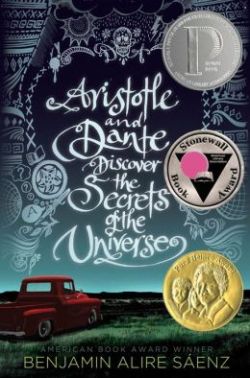Aristotle and Dante Discover the Secrets of the Universe is a 2012 young adult novel by Benjamin Alire Sáenz. This book has won a number of awards, including the Pura Belpré Award (for a Latino author whose work celebrates the Latino experience), the Lambda Award (for works which celebrate LGBT themes), and the Michael L. Printz honor (which means it was one of the runners-up for the best young adult novel of the year). I thought this work explored themes that really matter in a very realistic, engaging way.
The basic plot of the book focuses on the relationship between Ari and Dante. They meet and quickly become best friends during one summer. At the end of the summer, Ari dives in front of a car to save Dante. When Dante moves out of state for the next school year, he admits to himself and Ari that he is gay. Ari says he will always be his friend, but that he likes girls. When Dante returns the following summer, Ari’s parents sit him down and tell him that it’s obvious to everyone except Ari that he’s in love with Dante, and that they should be together. The story ends as Ari and Dante begin dating.
The novel is told from Ari’s point of view. The main shift in values occurs as Ari learns first to accept that his best friend is gay and has strong feelings for him, and then to accept that he himself is gay and reciprocates those feelings. The self-acceptance only comes in the last few chapters.
The theme of homosexuality blends very slowly into the novel. For the first 50-100 pages, Ari and Dante develop a very close friendship, but there is a marked lack of hitting on each other, or outward signs of physical attraction. The only intimacy is emotional. They even discuss dating and kissing girls, but at this point neither admits to same-sex attraction.
When Dante moves from the southwest to Chicago, he begins writing Ari letters to stay in touch. In these letters, he recounts his teenage experimentation with alcohol, marijuana, kissing girls, and finally with kissing boys. Ari is very apprehensive about Dante’s out-of-the-closet sexuality, because he fears that Dante may be attracted to him and that this may ruin their friendship. He becomes somewhat distant, and only writes back to 1 out of every 7 letters he receives. To me, this says that Dante is trying to figure out who he is with all his experimentation, and that he begins to settle on an identity when he admits to himself and his best friend that he is gay. Ari, on the other hand, continues to believe and say that he is straight; he has a crush on a girl at school, but not much comes of it. Perhaps Ari and/or Dante are bisexual.
Another big moment in the story is when Dante comes out to his parents. He was very afraid of how his family would react. He came out as a result of being beaten while kissing a boy; unfortunately, this hate crime is very realistic. Ari’s instinctively violent reaction to the news of his friend’s beating helps convince him (along with his instinctive reaction to push him out of the way of the car) that his strong feelings for Dante are more than just platonic, and that he’s probably bisexual or gay. Ari’s parents and Dante’s parents are both very supportive of their son’s sexualities, which is probably the case with many (but certainly not all) actual parents. In this case, both sets of parents could tell that their sons were gay before the sons admitted it to themselves and to their families.
One thing I really liked about this book, and probably one the reasons it won the Lambda award, is that it portrayed homosexuality as something that is quite normal. Nobody chooses to be gay, and it’s sometimes very difficult for young adults to admit to themselves that they are gay. While this one is sure to be challenged, I would definitely include it in a high school or middle school library.